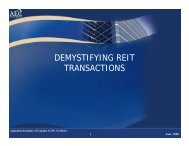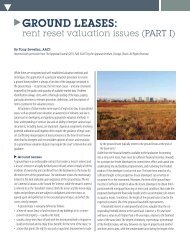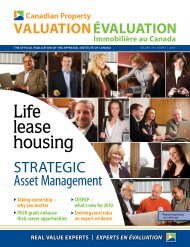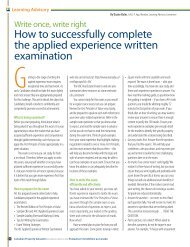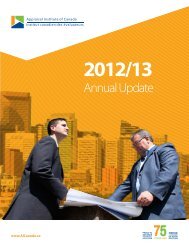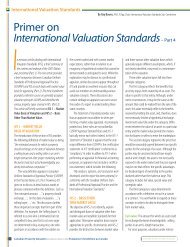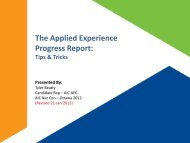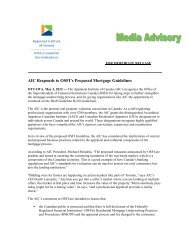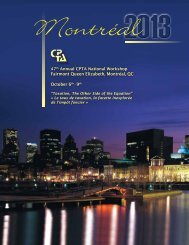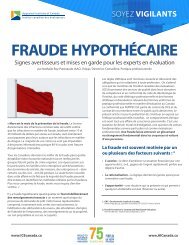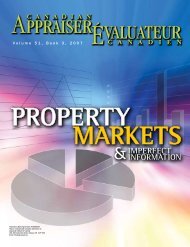Book 4 - Appraisal Institute of Canada
Book 4 - Appraisal Institute of Canada
Book 4 - Appraisal Institute of Canada
Create successful ePaper yourself
Turn your PDF publications into a flip-book with our unique Google optimized e-Paper software.
AppealBy Leonard Lee, AACIChair, Appeal CommitteeWhat happens at an appeal hearing?The Appeal Committee is responsible forappeals on matters arising from admissions,continuing pr<strong>of</strong>essional development,the course per year requirement, and theCandidate Registry. However, most cases heard bythe committee are appeals from decisions <strong>of</strong> theAdjudicating Committee relating to conduct sanctions(<strong>Appraisal</strong> <strong>Institute</strong> <strong>of</strong> <strong>Canada</strong> (AIC) Regulation5.50.2). Fresh evidence shall not be consideredunless it can be demonstrated that such evidencewas not reasonably available at the time <strong>of</strong> theadjudicating hearing (AIC Regulation 5.53.3).The Appeal Committee is responsible to establishits own rules <strong>of</strong> practice, where not specified inthe AIC Regulations.Most Appeal Committee hearings take twoto three hours. A typical hearing will include themember charged (with or without legal counsel),the pr<strong>of</strong>essional practice advocate (with or withoutlegal counsel), a court reporter, and the AppealCommittee hearing panel, which typically consists<strong>of</strong> three members.Before the hearing, the hearing panel will havebeen provided with the Adjudicating Committeedecision, notice <strong>of</strong> appeal, grounds <strong>of</strong> appeal, anywritten submissions or other materials supplied bythe parties, and the documentary evidence thatwas presented to the Adjudicating Committee. Inthe written submissions, it is recommended thatthe member charged include a statement on therecommended discipline and costs.It is recommended that, in the case <strong>of</strong> a partywishing to present new evidence, a separate submissionseeking leave to present new evidence beprovided to the AIC <strong>of</strong>fice at least seven days priorto the commencement <strong>of</strong> the hearing. It is withinthe discretion <strong>of</strong> the chair <strong>of</strong> the Appeal Committeeor the hearing panel to make a decision concerningthe presentation <strong>of</strong> new evidence.A hearing generally follows this process:1. The chair will open the hearing by reading thecharged member’s name and the file numberinto the record and noting the persons inattendance.2. The chair will ask all parties for acknowledgementthat the provisions <strong>of</strong> the AIC Regulationshave been met with respect to giving noticesand whether the exchange <strong>of</strong> other informationand documents has been sufficient.3. The chair will ask the parties if they have anyobjections to the hearing proceeding on anygrounds, other than the objections to the findingsin the Adjudicating Committee decision.4. The pr<strong>of</strong>essional practice advocate will tendera hearing book containing documentaryevidence presented to the Adjudicating Committeeand the decision <strong>of</strong> the AdjudicatingCommittee. The hearing book will be labeled.5. The chair will ask the member charged if thereare any objections to the admissibility <strong>of</strong> thehearing book being labeled.6. The pr<strong>of</strong>essional practice advocate and themember charged will be invited to make openingstatements (not a mandatory step).7. All testimonial evidence is to be given underoath.8. If the chair <strong>of</strong> the Appeal Committee or thehearing panel has allowed an application topresent new oral evidence, then there will bean opportunity to call a witness to give thatevidence and all the other parties will have theopportunity to cross-examine that witness.9. Usually the party appealing proceeds first topresent argument as to why the AdjudicatingCommittee decision should be overturnedor varied.10. The member charged should set out the nature<strong>of</strong> the order sought from the hearing panel.11. Members <strong>of</strong> the hearing panel may ask questions<strong>of</strong> the member charged.12. The pr<strong>of</strong>essional practice advocate will presenthis/her argument and submissions.13. The pr<strong>of</strong>essional practice advocate should setout the nature <strong>of</strong> the order sought from thehearing panel.14. Any rebuttal that the pr<strong>of</strong>essional practiceadvocate wishes to make to the member’spresentation should be included as part <strong>of</strong> hisargument and submissions.15. Members <strong>of</strong> the hearing panel may ask questions<strong>of</strong> the pr<strong>of</strong>essional practice advocate.16. Any rebuttal that the member charged wishesto make on the argument and submissions <strong>of</strong>the pr<strong>of</strong>essional practice advocate will be givenan opportunity to do so.17. AIC will provide the hearing panel with a copy<strong>of</strong> the charged member’s record from thenational pr<strong>of</strong>essional practice database. Thisrecord is deemed to be accurate and subject toa rebuttal from the member.18. The chair <strong>of</strong> the hearing panel will concludethe hearing and indicate the decision will bereserved and prepared within 60 days <strong>of</strong> thehearing.This process is typically followed at an appealhearing to ensure that all parties are given equalopportunity to present their case.Appeal CommitteeLeonard Lee, AACI – ChairAllan Beatty, AACI, FellowJohn Shevchuk, AssociateAndrew Chopko, AACIGordon J. Tomiuk, AACI, FellowTo contact this committee, email:appeal@aicanada.ca40Canadian Property Valuation Volume 54 | book 4 | 2010 Évaluation Immobilière au <strong>Canada</strong>click here to return to table 0f contents



